How one Wakawaka Doctor reader secured MSc Scholarship in France
From dream to interview: How a WakaWaka Doctor reader secured an MSc scholarship in France (+ Your Complete Interview Prep Guide)
“Your videos and guidance played a key role in helping me get this far, and I’m truly grateful.”
This heartwarming message landed in our inbox recently, and it perfectly captures why we do what we do at WakaWaka Doctor. A dedicated reader who followed our scholarship guidance was selected for an MSc scholarship interview in France!

But here’s the thing – getting the interview is just the beginning. The real challenge starts now.
That’s why we’re turning this success story into your complete roadmap for acing scholarship interviews, especially for French universities. Whether you’re preparing for your first scholarship interview or looking to improve your approach, this guide has everything you need.
The scholarship in France Story that started it all
Our reader’s scholarship in France journey began months ago when they started following our scholarship application strategies. Like many of you, he had big dreams but wasn’t sure how to turn them into reality. Fast forward to today, and he’s preparing for what could be a life-changing interview.
What made the difference? Consistent preparation, strategic application, and most importantly, the right guidance at the right time.
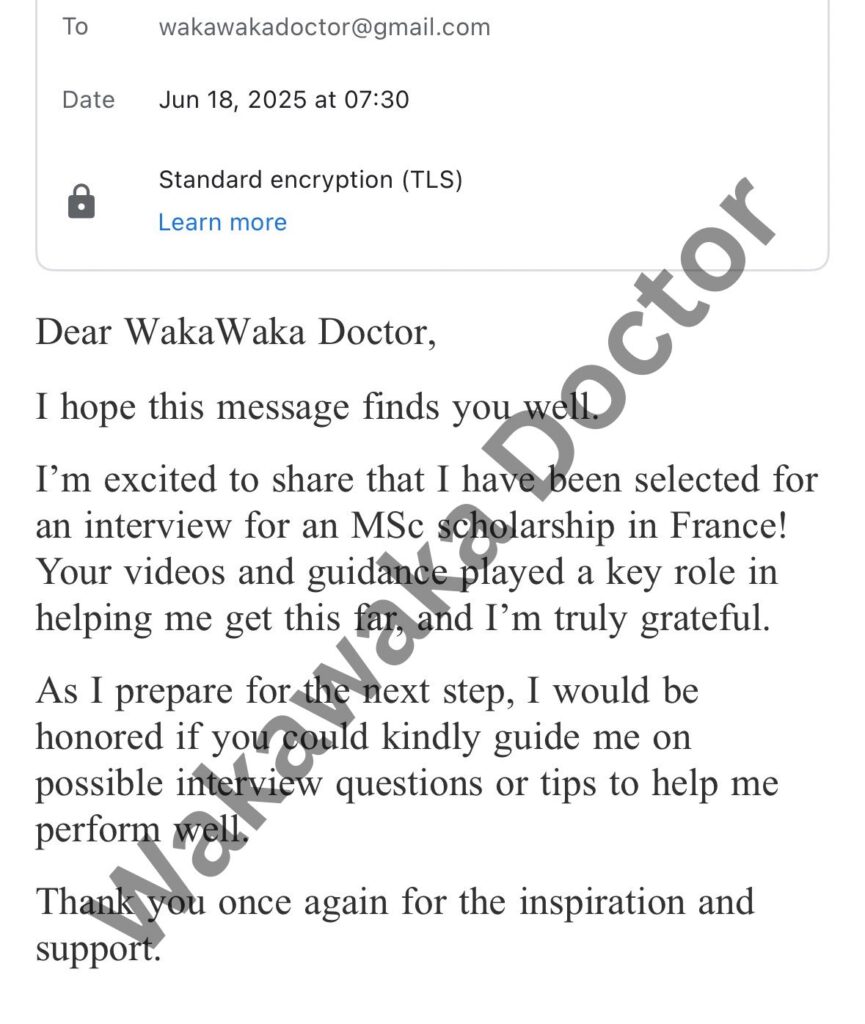
Now, let’s make sure you’re equally prepared for your moment.
Your Complete MSc Scholarship Interview Preparation Guide
Phase 1: Pre-Interview Foundation (2-3 Weeks Before)
Master Your Application Inside Out
- Memorise every detail of your personal statement
- Review your academic transcripts and be ready to explain any gaps
- Prepare specific examples that demonstrate your key achievements
- Practice articulating your research interests in 2-3 sentences
- Research Like Your Future Depends On It (Because It Does)
- Study the university’s research centres and recent publications
- Identify 2-3 professors whose work aligns with your interests
- Understand the program structure and unique selling points
- Research current events in your field of study
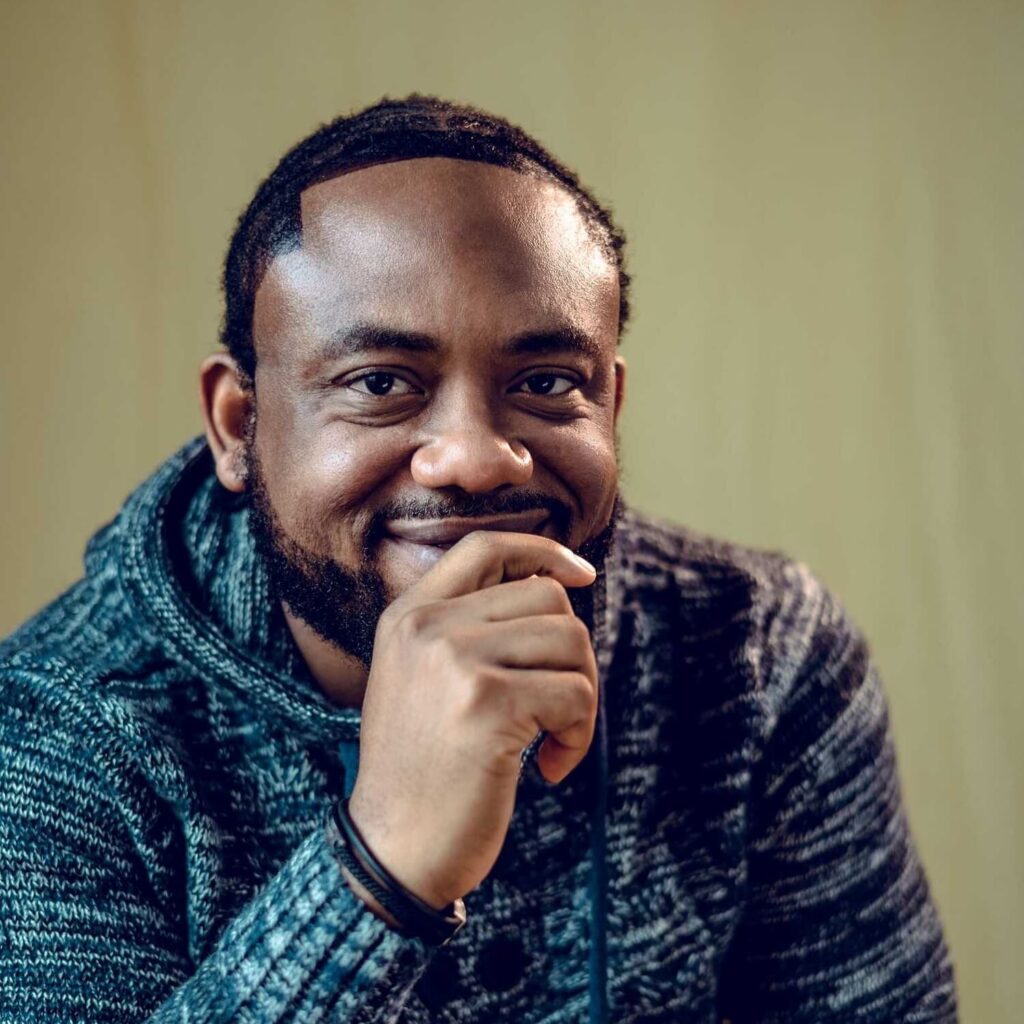
Phase 2: Question Preparation (1-2 Weeks Before)
The Academic Excellence Questions
“Why do you want to pursue this specific MSc program?”
- Connect your career goals to the program’s strengths
- Mention specific courses, research opportunities, or faculty
- Avoid generic answers about “good education”
“What’s your research interest, and how does it fit our program?”
- Have a clear, focused research area in mind
- Connect it to ongoing research at the university
- Show you understand the current gaps in the field
“How will this scholarship impact your career?”
- Be specific about your 5-10 year plan
- Explain how you’ll contribute back to your home country/community
- Demonstrate that this isn’t just about personal gain
The Personal Motivation Questions
“Why should we choose you over other candidates?”

- Focus on unique experiences, not just grades
- Highlight leadership, research, or volunteer experiences
- Quantify your achievements wherever possible
“What challenges have you overcome to get here?”
- Prepare a compelling but concise story
- Focus on how the challenge made you stronger
- Connect it to your readiness for graduate studies
“How do you handle academic pressure and deadlines?”
- Give specific examples from your undergraduate experience
- Mention the time management systems you use
- Show you understand the rigour of graduate school
The France-Specific Questions
“Why France specifically for your studies?”
- Research France’s leadership in your field
- Mention specific French innovations or researchers
- Show cultural awareness and genuine interest
“How will you adapt to studying in French academic culture?”
- Demonstrate knowledge of the French academic system
- Show language preparation efforts
- Express excitement about cultural exchange
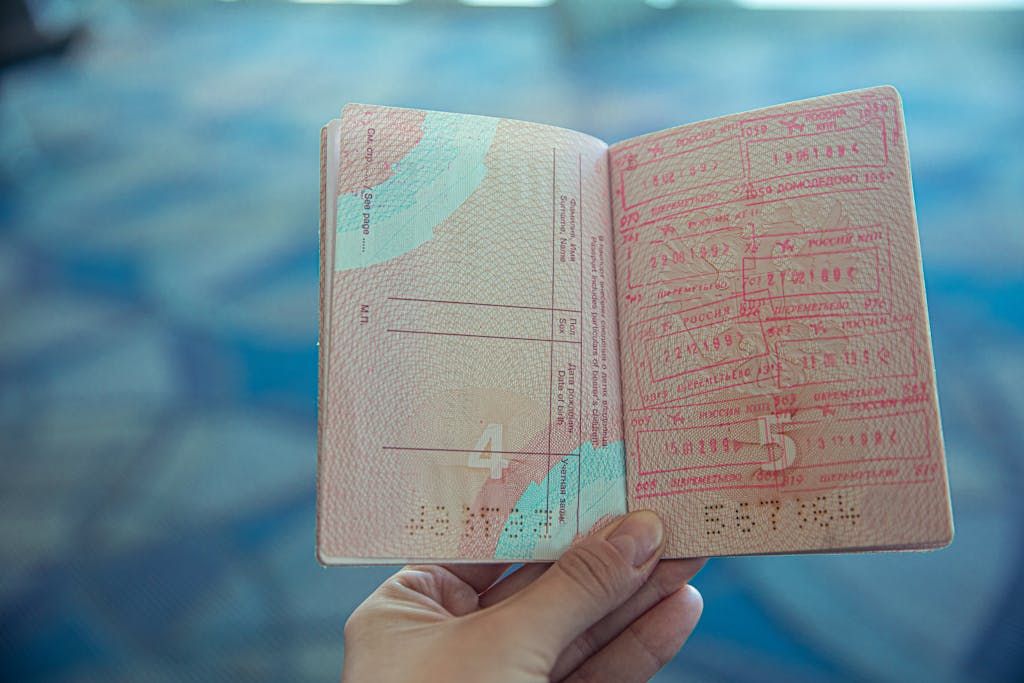
Phase 3: Advanced Preparation (1 Week Before)
Technical Deep-Dive Questions
“Explain a recent development in your field”
- Choose something from the last 12 months
- Explain its significance in simple terms
- Connect it to your intended research area
“What’s your thesis idea for this program?”
- Have a preliminary topic ready
- Show it’s feasible within the program timeframe
- Demonstrate awareness of required resources
“How would you contribute to our research community?”
- Mention relevant skills (lab techniques, software, languages)
- Discuss the collaboration experience
- Highlight any unique perspectives you bring

Phase 4: Your Questions for Them
Show Your Serious Intent
“What opportunities exist for international students to get involved in ongoing research projects?”
“How does the program prepare students for PhD studies or industry careers?”
“What support systems are available for international students?”
“Can you tell me about recent graduate success stories?”
Phase 5: Presentation Excellence
Virtual Interview Mastery
- Test your technology 24 hours before
- Ensure professional lighting and background
- Have a backup internet connection ready
- Prepare printed copies of key documents
- Body Language That Wins
- Maintain eye contact (look at the camera, not the screen)
- Use confident hand gestures
- Sit up straight but remain relaxed
- Smile genuinely when appropriate
- Voice and Communication
- Speak slightly slower than normal conversation
- Pause before answering complex questions
- Use the STAR method (Situation, Task, Action, Result) for examples
- Practice pronouncing French names correctly
The Day-Of Success Formula
- 2 Hours Before
- Review your key talking points (don’t memorise scripts)
- Do light exercise to manage nerves
- Eat a proper meal
- Gather all required documents
- 30 Minutes Before
- Log in to test your connection
- Do vocal warm-ups
- Review the interviewer’s names and pronunciation
- Take three deep breaths
- During the Interview
- Take 2-3 seconds to think before answering
- Ask for clarification if you don’t understand a question
- Use specific examples rather than general statements
- Show enthusiasm without being over-eager
Post-Interview Strategy
- Within 24 Hours
- Send personalised thank-you emails to each interviewer
- Mention something specific from your conversation
- Reiterate your strong interest in the program
- Provide any additional information they requested

Follow-Up Timeline
Week 1: Thank you, email sent
Week 2-3: Patient waiting (don’t follow up unless they specified a timeline)
Week 4+: Polite inquiry about decision timeline (if not previously specified)
Common Mistakes That Kill Your Chances
The Fatal Errors
Generic answers that could apply to any program
Inability to articulate your research interests clearly
Poor knowledge of the university and the program
Appearing more interested in living in France than studying
Weak or non-existent questions for the interviewers
The Subtle Mistakes
Speaking too fast due to nerves
Not providing specific examples
Appearing overconfident or arrogant
Forgetting to mention how you’ll contribute back
Poor technical setup for virtual interviews
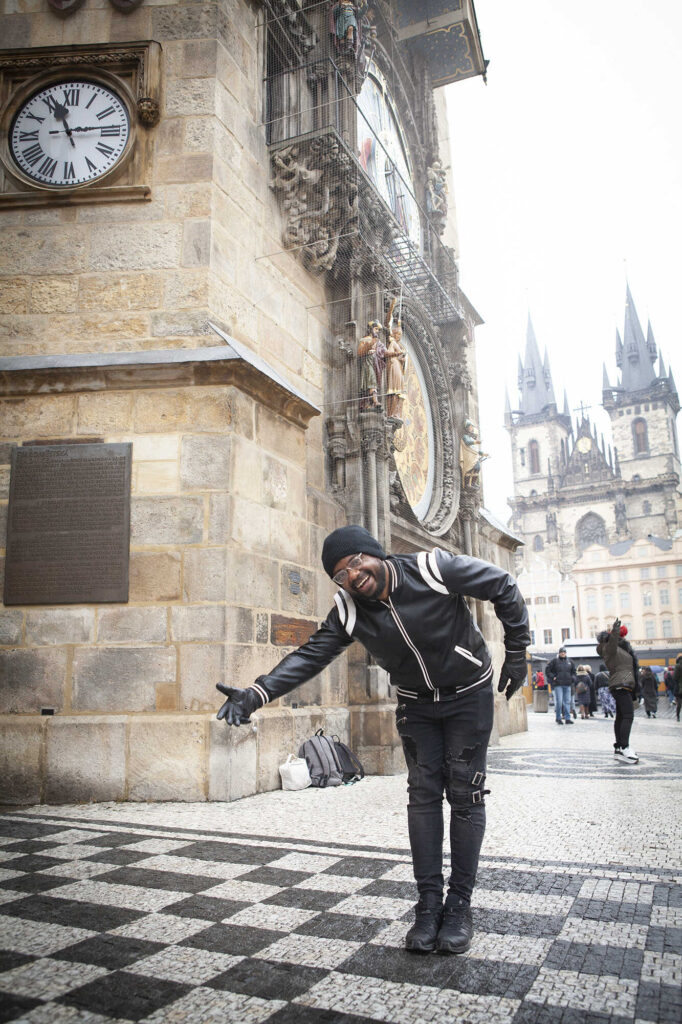
Summary
Our reader’s scholarship in France’s success story didn’t happen by accident. It came from preparation, dedication, and following proven strategies. Now it’s your turn.
Remember: scholarship committees aren’t just looking for the smartest candidates – they’re looking for students who will make the most of the opportunity and contribute meaningfully to their academic community.
Your interview is your chance to show them that the person is you.
Good luck, and remember – we’re rooting for your success just like we celebrated our reader’s achievement this week!
Have your own scholarship success story? We’d love to hear from you! Send us your updates and questions – your journey might be the inspiration another reader needs.



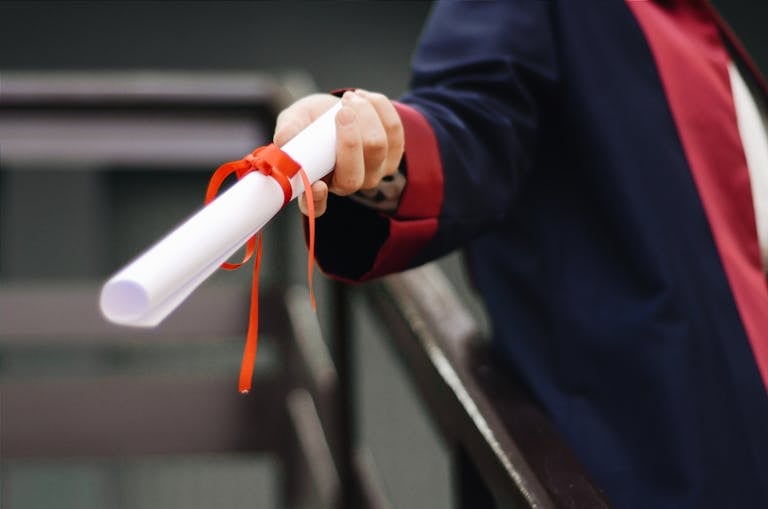


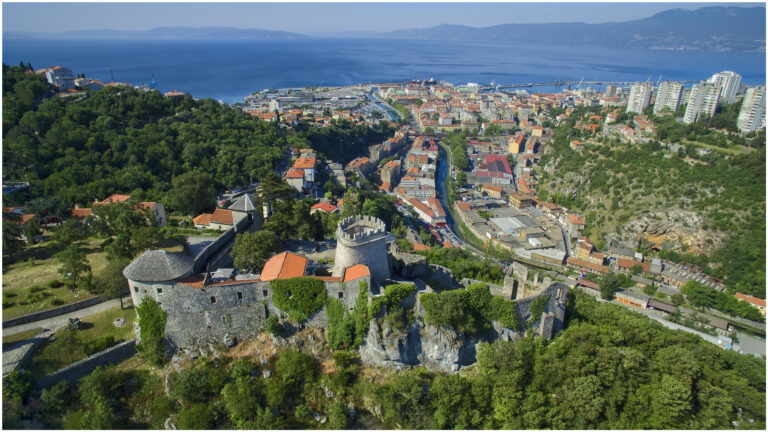

Naze umukwoma Owerri imo state Nigeria
Hello, Stephanie.
Good morning Sir. My name is Bendu konneh am from Liberia currently living in Guinea 🇧🇴 am 💯 percent interest and Passionate about health care assistant work permit career abroad, with Caregiver certification WAKAWAKA DOCTOR Thanks you so much for Always sharing scholarship opportunité make god bless you ❤️
Amen! thank you, too, Bendu. Would you love a personal session?
Dear Doctor Wakwaka,
I am very excited to read your stuff as my daily meals . Anytime I go on social media your pops up on my notifications and straight i read them before any other.
I have good number of platforms I shares your stuff with them and I know the good and serious ones will share their success stories with you very soon.
Anytime you visit Ghana let me know because i will soon establish “Wakawaka Doctor Fund Platform to champion solely your teachings and work because you are so helpful. I love your work.
Kudos
Evans Dinko, Ghana
tel:+233 246285307
Email: edinko2@gmail.com
Thank you so much, Evans. That is humbling and means so much to me. Of course, when next i am in Ghana, i do hope we meet.